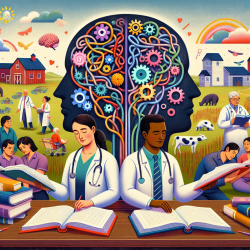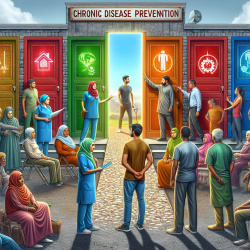Introduction
As practitioners dedicated to improving outcomes for children, understanding the broader social determinants that affect health is crucial. A recent study titled Perceived general, mental, and physical health of Latinos in the United States following adoption of immigrant-inclusive state-level driver’s license policies: a time-series analysis sheds light on how state policies can influence health outcomes. This research provides valuable insights into the positive effects of immigrant-inclusive driver’s license policies on the health of Latino communities in the United States.
The Study and Its Findings
The study utilized data from the Behavioral Risk Factor Surveillance System (BRFSS) from 2011 to 2019, focusing on Latino adults in states with and without immigrant-inclusive driver’s license policies. The findings revealed that in states where such policies were enacted, there was a significant decrease in the number of perceived poor physical health days per month, from 4.30 to 3.80 days. Additionally, the proportion of adults reporting poor physical and mental health days decreased significantly.
These findings suggest that allowing immigrants to obtain driver’s licenses, regardless of their immigration status, can improve access to healthcare, social services, and employment opportunities, thereby enhancing physical and mental health outcomes.
Implications for Practitioners
For practitioners in the field of speech-language pathology, these findings emphasize the importance of considering the broader social and policy context when working with children from immigrant families. Here are some ways practitioners can implement these insights:
- Advocate for Inclusive Policies: Support policies that promote access to essential services for immigrant families. This can include participating in advocacy efforts or collaborating with organizations that work towards policy change.
- Understand the Impact of Stress: Recognize the stress and anxiety that restrictive policies can cause immigrant families, which can affect children's communication and learning abilities.
- Provide Supportive Environments: Create safe and supportive environments in schools and therapy sessions that acknowledge and address the unique challenges faced by immigrant families.
- Encourage Further Research: Engage in or support further research to explore the impact of social policies on health outcomes, particularly in the context of speech and language development.
Conclusion
Immigrant-inclusive policies have the potential to significantly improve health outcomes for Latino communities, reducing health disparities and enhancing overall well-being. As practitioners, staying informed about these policies and their impacts can help us better serve our communities and advocate for positive change.
To read the original research paper, please follow this link: Perceived general, mental, and physical health of Latinos in the United States following adoption of immigrant-inclusive state-level driver’s license policies: a time-series analysis.










